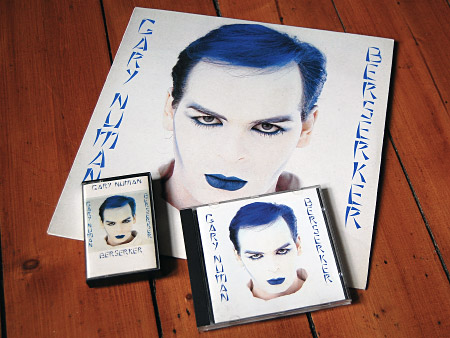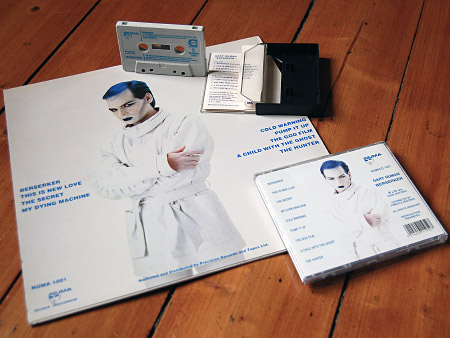‘Berserker’ was the first album released on Gary Numan’s own label after he decided to up sticks and move on from his previous long established Beggars Banquet/WEA home. Numan mentioned in his ‘Praying to the Aliens’ autobiography how he felt that he had outstayed his welcome there, with the attitude that his success had plateaued at an acceptably comfortable level of sales, as evinced by the lack of promotional support, particularly for 1983’s ‘Warriors’ album. Intended as a fresh start, this new home, ‘Numa’ records, would see three Numan album releases in the label’s original incarnation from 1984-1987, before Numan inked a new deal with IRS records for 1988’s ‘Metal Rhythm’ – though Numa would be reactivated again in the 1990s for further new album releases (and reissues).

This initial ‘Numa’ era came complete with a new sound, with the familiar analogue synthesizers of previous albums largely pushed aside for a more precise, harder edged, sequenced and sampled sound courtesy of the newer generation of digital synths, the PPG Wave in particular proving to be both hero and villain over the course of Numa time, with Numan’s eventual self-confessed over-reliance on it as a source of ideas. (Ironically, Gary has since noted in interviews that it wasn’t actually until much later in his career that he himself would master the art of sequencing and sampling by himself, when it became more a matter of survival when finances dried up.)

As well as the new sounds, this debut Numa album release also witnessed for the first time a new approach by the release of differing versions of the album for different media formats, with the cassette edition of the album containing extended length versions of most of the songs. As well as the ‘Berserker’ album, similar extended versions would also appear for ‘The Fury’, ‘Machine and Soul’, ‘Sacrifice’ and ‘Exile’ over subsequent years.
When later released on CD format, it was the extended versions, as per the cassette release, that made up the first Numa records CD release of ‘Berserker’ (Numa, NUMACD 1001). (There would be a 1991 re-release as well.) As a direct comparison, here is a list of the approximate track timings as a guide, the original vinyl durations as compared with the extended cassette/CD versions.
| Vinyl LP | Extended Cassette / CD | |
| Berserker | 5:50 | 6:40 |
| This Is New Love | 6:15 | 8:45 |
| The Secret | 5:54 | 6:40 |
| My Dying Machine | 5:33 | 9:04 |
| Cold Warning | 6:57 | |
| Pump It Up | 4:45 | 4:45 |
| The God Film | 4:41 | 4:41 |
| A Child With The Ghost | 4:04 | |
| The Hunter | 4:31 | 6:47 |
* Note: The vinyl LP label states 4:03, but actual track duration is 5:58
** Note: The vinyl LP label states 3:04, but actual track duration is 4:04
Following Gary Numan’s championing by a new generation of the great and the good (or, at least, popular…) and his subsequent critical rebirth in the mid 1990s, interest picked up such that ‘Berserker’ (as well as the other original Numa records albums) were re-issued on CD by the end of that decade – and in so doing, a hybrid version appeared, on the Eagle Records CD releases. Firstly, the ‘Numa Years’ 5 CD box set appeared (EAGBX025), but later on individual releases of each album also appeared, including ‘Berserker’ (EAMCD072). These Eagle label editions of the album took the standard length versions from the original vinyl LP and added a selection of bonus tracks. Of note is ‘Cold Warning’ – the original vinyl LP states a duration of 4’03” for this song, but it I timed it from my vinyl copy to be 5’58” actually.
Here is what appeared on the Eagle CDs;
Berserker (5:50)
This Is New Love (6:15)
The Secret (5:54)
My Dying Machine (5:33)
Cold Warning (6:01)
Pump It Up (4:45)
The God Film (4:41)
A Child With The Ghost (4:04)
The Hunter (4:31)
Bonus tracks:
Empty Bed, Empty Heart (3:12)
Here Am I (5:46)
She Cries (6:01)
Rumour (2:50)
This Ship Comes Apart (4:01)
Unfortunately, all is not quite right when it comes to the bonus tracks on this edition – all of them have been transferred at a slightly slower speed than they should be. However, they can all be found on other compilation CDs in the correct form, except for ‘This Ship Comes Apart’. e.g. the 2001 compilation CD ‘Down In The Park: The Alternative Anthology’ has all of these B sides at the correct speed except that final one. At the time of writing, the Eagle CD editions are long out of print and appear to change hands for above average prices.
Numan’s American label of the time, Cleopatra, issued a largely similar version (Cleopatra CLP 0536-2), but with a different selection of bonus tracks – the extended versions of ‘Berserker’ and ‘My Dying Machine’ plus ‘Empty Bed, Empty Heart’ and ‘Here Am I’, the B sides from the two singles.
New dreams for old…
If you are unfamiliar with the album – and I dare say many may well be, as I think it was a crucial album for many existing fans as their point of departure in their fandom of all things Numan – it is worth a fresh listen. The combination of the increasingly funked-up music and the rather out-there blue hair/white pancake make-up look was probably a step too far, especially coming hot on the heels of the ‘Mad Max’ look of the previous ‘Warriors’ album/tour, causing a good many to move on. The somewhat unique blend of beautiful analogue synth sounds along with piano and viola to the fore of the classic ‘Pleasure Principle’ / ‘Telekon’ era had slowly been making way album by album – to the point where by ‘Berserker’ a cleaner, harder-edged, more precise sound was being fashioned from digital synths and drums, but with more mainstream funk-bass, female backing vocals and saxophone pushing the pianos and violas almost completely out of the picture. The crossover tracks of both worlds are the likes of ‘Cold Warning’, viola still present and correct, and ‘The Hunter’, with a trace of the kind of anthemic sound familiar from the likes of ‘We Are Glass’. Elsewhere, ‘The God Film’ starts off pretty much a re-write of Brian Eno’s ‘Skysaw’ in its chord progressions. ‘This Is New Love’ had previously been premiered in a fairly different version on UK Saturday evening primetime TV earlier in 1984, the most striking difference being the complete absence of the female backing vocals. Meanwhile, in a fairly radical departure for Numan at the time, a fair amount of closing track ‘The Secret’ is sung instead by guest vocalist Zaine Griff.
All in all, I still hold something of a soft spot for this album, even though it has less of the unique qualities of the earlier work.

